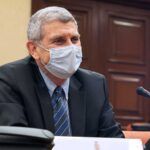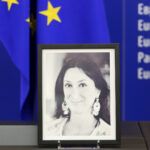The shelling of Maternity Ward No. 3 in Mariupol is a war crime and took the life of innocent civilians, including children. Top Russian officials confirm the targeting of the facility, but claim it was a stronghold of “radicals”. They are lying.
The cynical lies about Mariupol
The attack on a maternity ward in besieged Mariupol illustrates the challenge of lying. 17 people were killed, according to media reports. The facts are easily corroborated; the attack has been carefully documented with a large number of pictures from several sources – professional news photographers, social media updates and forensic investigators. Manuals for open source investigation of Russian troop movements are easily available; thousands take part and share the facts.
The Kremlin, obdurately lying about “not targeting civilians”, is attempting to lie about the attack, but faces both of the disadvantages of lying mentioned above. When Foreign Minister Sergey Lavrov lies about “no attack taking place”, his lying is just naked and not even shrouded in the veil of credibility. He knows he is lying; he knows everyone knows he is lying. Lavrov’s job is to lie, and he performs poorly, just parroting talking points, handed to him by his masters:
We have heard an emotionally charged outcry over the so-called “atrocities” allegedly committed by the Russian armed forces. Three days ago, on 7 March, our delegation at the UN Security Council meeting provided facts to prove that this maternity hospital had been taken over by the far-right Azov battalion, who ordered all pregnant women, medical nurses and other personnel out of the building. You can draw your own conclusions about the manipulation of public opinion around the world.
The Kremlin’s media were quick to repeat Lavrov’s claims.

Disinformation: 7 myths about the Russia-Ukraine conflict |
The ever-green, manipulative narrative of the Azov Battalion
One key Kremlin lie about the war against Ukraine is about the country being controlled by Nazis. That very lie has been repeated hundreds of times during the last few years. Still not true.
The Kremlin regularly tries to “prove” the presence of Nazis in Ukraine, including at the highest levels of government, by using the narrative of the Azov Battalion, a unit of some 1,000 men. The unit was originally set up by nationalists in 2013, and donned some insignia with strong connections to Nazism. The Kremlin disinformation machine has inflated this battalion to enormous and absurdly overblown proportions: a fairly small army unit inflated to the size of an entire army. Extremism in Ukraine is a frequent topic for discussions, and the pluralistic society of Ukraine has instruments to handle the challenge of Nazism in the country. All manifestations of Nazism are banned in Ukraine. The Verkhovna Rada, at its meeting of 9 April 2015, adopted a law “On the Condemnation of the Communist and Nazi totalitarian regimes in Ukraine and the prohibition of propaganda of their symbols”. The document recognises that communist and national socialist (Nazi) totalitarian regimes in Ukraine are criminal and prohibits the public use and propaganda of their symbols. The Nazi totalitarian regime at the legislative level is recognised in Ukraine as pursuing a policy of state terror. Also, the right-wing extremists in Ukraine – whose presence no one is denying – are in the margins and have failed miserably in every election since 2014.
Russia, on the other hand, has frequently allowed propaganda for fascism in Kremlin and oligarch media outlets, hailing Franco and Mussolini.

European sanctions against disinformation by the parliamentary commission |
True Lies
The Kremlin is desperately attempting the well-tested means of flooding the information space with contradictory messages in order to obscure the actual facts. It has attempted the method in the cases of Skripal, Navalny and flight MH17, to mention just a few. Lies and violence are closely knitted in the Kremlin disinformation efforts. Lies are employed to hide the violence; violence is employed to hide the lies. In the meantime, the International Criminal Court has initiated the process of collecting and analysing all documents available for a future case against the perpetrators.
Source: EUvsDisinfo







Leave a Reply